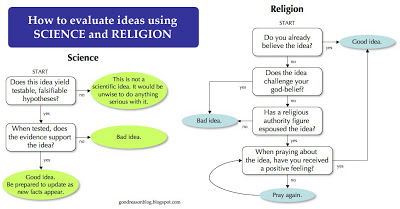I was invited to a semi-formal dinner by a charming and gracious coterie of students the other evening. Speeches were made, dessert was had, and the wine and the orange juice were mingled in equal measure. It’s always a pleasure to have a few hours of conversation with intelligent people. My only concerns were keeping my forks straight, and not seeming to be the crusty atheist professor of university lore. I’m not all that crusty really, so I did okay.
But one student, knowing my views, asked, “Is atheism falsifible?”
I’d been talking about falsifiability in class, you see. In order for a theory to be scientifically valid, there needs to be a way to prove it’s wrong. In class I’d used the example of last-Thursdayism: the belief that the entire universe was created last Thursday, complete with buildings, people, and everything, mostly just as it is now. And if you tell a last-Thursdayist “I think I can remember stuff that happened before last Thursday,” they’ll say, “Those are false memories that were created in your mind at the same time as everything else.” There’s no evidence you can present that would disprove their theory. And theists often say “You can’t prove God exists, but you can’t disprove it either,” as though this was a strength. In fact, this non-falsifiability is reason enough to throw it out. If a theory isn’t falsifiable, it isn’t helpful.
So, is atheism falsifiable? My first response was “Atheism makes no claims, it merely asserts that the claims of theists are baseless.” Which is a kind of claim, so I wasn’t entirely happy about that answer.
When I thought about it for a few more seconds, I realised that there are many things that would conceivably falsify atheism:
- God, angels, or supernatural beings could appear and allow themselves to be examined.
- There could be a study that shows that some goddy practice leads to some effect, in such a way that only supernatural forces could be at work. Many such studies have been tried (for example, the healing power of prayer), but so far nothing has worked reproducibly.
- Evidence of something having been created.
- Any kind of reproducible phenomenon that could only be explained by resorting to some kind of supernatural force.
So far, such evidence has not been forthcoming, and I’m not holding my breath. That’s why I provisionally accept the atheist point of view. If such evidence comes to light, I’ll examine it, and change my view.
However, if this evidence were to appear, it wouldn’t necessarily drive me back to church. I’d still have the question of which religion to use. There are millions, and believers have no consensus about which one is correct because there’s no data to appeal to. Just another problem for a non-empirical theory.







Recent Comments